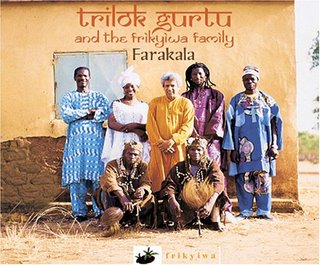Dave Douglas - Meaning & Mystery (2006)
Dave Douglas - Meaning & Mystery (2006)

AMG Review by Thom Jurek:
Dave Douglas has been involved in a number of projects over recent years that have kept his fine quintet from recording since 2002. Meaning and Mystery showcases the band -- Douglas on trumpet, Uri Caine on Fender Rhodes, bassist James Genus, and drummer Clarence Penn -- with its first personnel change as tenor saxophonist Donny McCaslin replaces Chris Potter, whose own star is rising and is too busy to maintain a constant presence in the group. McCaslin, who is less well known, is no less a player. His voice on the horn is unique, and his phrasing complex and songlike. "Song for Susannah" begins with a single note repeated on the trumpet before elaborating on it enough for the band to enter and dig songlike into its core in 12/8. Genus is a wonder here, shifting his solo around the figure, moving in and out of the lyric as Caine paints the backdrop with Penn, who plays around and through the time frame, never losing the band. The standout track here is "Culture Wars." Douglas has never made bones about Miles being a huge influence -- he even refers to it in the liner notes. Obviously, the quintet format echoes the great inconoclasts as well. But Douglas moves it into other areas. The open, relaxed, moody atmosphere of the cut begins slowly, reminding one -- perhaps because of Caine's Rhodes playing -- of Davis' In a Silent Way, particularly when the simple groove takes over. Genus' ostinato is infectious, chantlike, hypnotic. Douglas' solo leads off, and he swoops in and out at will, playing all around the simple 4/4 time before the song -- like heat -- rises. When McCaslin slides in with his solo, one can hear his own sense of deep lyricism, his attention to mode, and an authority that is all his own -- though one can hear the labyrinthine exploration of Wayne Shorter in his voicings as well. Likewise, Caine's solo -- full of nuance and color -- is strong, bringing a new focus to the Fender Rhodes in the current era. Other standout cuts include the cool blues nod to Tim Berne in "Tim Bits," the knotty "The Sheik of Things to Come," and the beautiful and simply melodic and airy "Blues to Steve Lacy." In the latter half, the shifting stop-and-start figures in "Elk's Club" that mix blues and bop with humor are wonderful. "The Team" is another blues, through a fractured one, also possessed of great warmth and some hard-swinging modal approaches woven into the hard bop frame. Meaning and Mystery is yet another album in the Douglas catalog that showcases his fine compositional and arrangement abilities, but more than this, it's the sound of a group in the process of continued restless development long after the bandmembers have found their collective voice.
http://rapidshare.com/files/12009960/DDMM.rar
192 kbps, 83MB, no pw

AMG Review by Thom Jurek:
Dave Douglas has been involved in a number of projects over recent years that have kept his fine quintet from recording since 2002. Meaning and Mystery showcases the band -- Douglas on trumpet, Uri Caine on Fender Rhodes, bassist James Genus, and drummer Clarence Penn -- with its first personnel change as tenor saxophonist Donny McCaslin replaces Chris Potter, whose own star is rising and is too busy to maintain a constant presence in the group. McCaslin, who is less well known, is no less a player. His voice on the horn is unique, and his phrasing complex and songlike. "Song for Susannah" begins with a single note repeated on the trumpet before elaborating on it enough for the band to enter and dig songlike into its core in 12/8. Genus is a wonder here, shifting his solo around the figure, moving in and out of the lyric as Caine paints the backdrop with Penn, who plays around and through the time frame, never losing the band. The standout track here is "Culture Wars." Douglas has never made bones about Miles being a huge influence -- he even refers to it in the liner notes. Obviously, the quintet format echoes the great inconoclasts as well. But Douglas moves it into other areas. The open, relaxed, moody atmosphere of the cut begins slowly, reminding one -- perhaps because of Caine's Rhodes playing -- of Davis' In a Silent Way, particularly when the simple groove takes over. Genus' ostinato is infectious, chantlike, hypnotic. Douglas' solo leads off, and he swoops in and out at will, playing all around the simple 4/4 time before the song -- like heat -- rises. When McCaslin slides in with his solo, one can hear his own sense of deep lyricism, his attention to mode, and an authority that is all his own -- though one can hear the labyrinthine exploration of Wayne Shorter in his voicings as well. Likewise, Caine's solo -- full of nuance and color -- is strong, bringing a new focus to the Fender Rhodes in the current era. Other standout cuts include the cool blues nod to Tim Berne in "Tim Bits," the knotty "The Sheik of Things to Come," and the beautiful and simply melodic and airy "Blues to Steve Lacy." In the latter half, the shifting stop-and-start figures in "Elk's Club" that mix blues and bop with humor are wonderful. "The Team" is another blues, through a fractured one, also possessed of great warmth and some hard-swinging modal approaches woven into the hard bop frame. Meaning and Mystery is yet another album in the Douglas catalog that showcases his fine compositional and arrangement abilities, but more than this, it's the sound of a group in the process of continued restless development long after the bandmembers have found their collective voice.
http://rapidshare.com/files/12009960/DDMM.rar
192 kbps, 83MB, no pw















